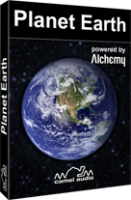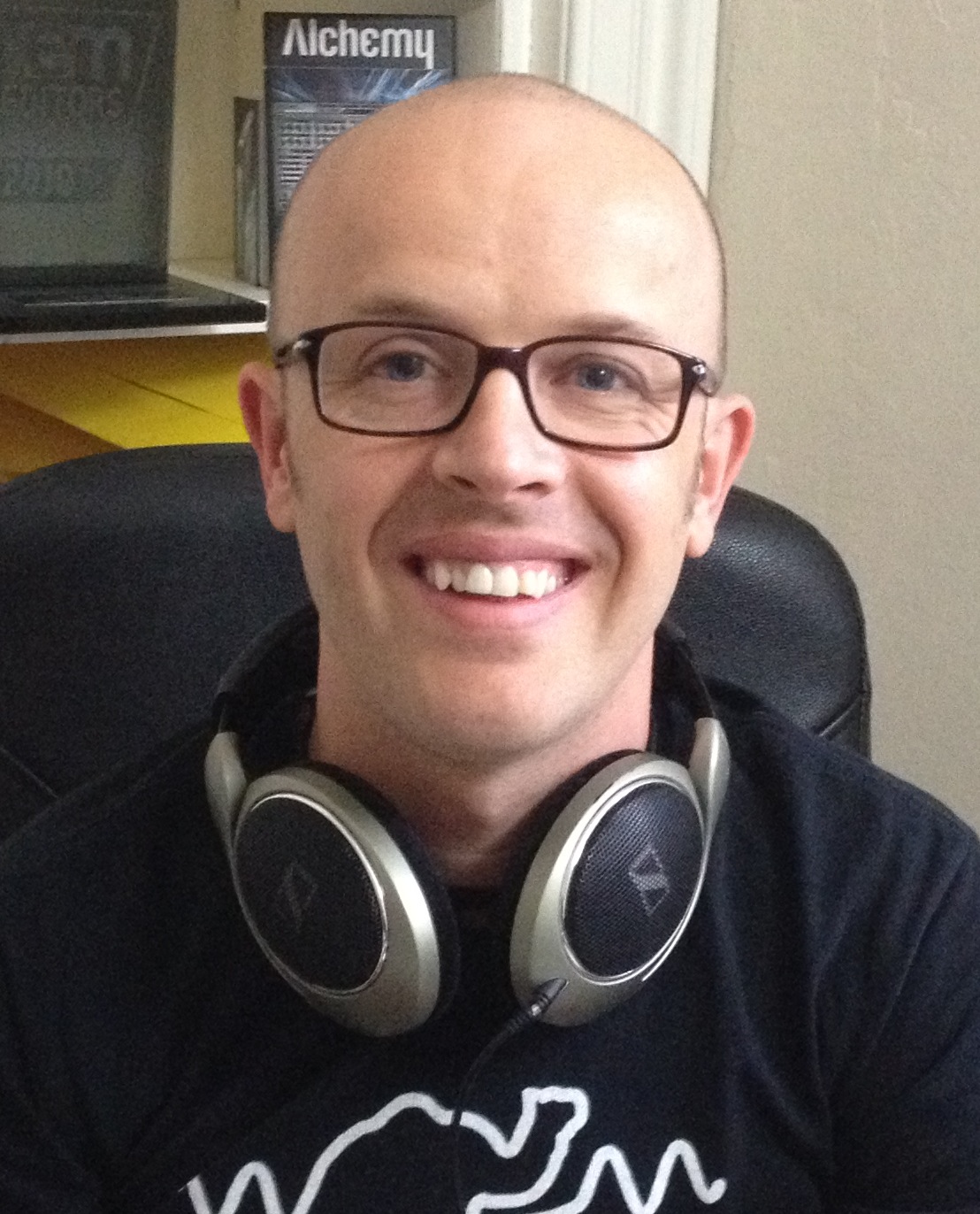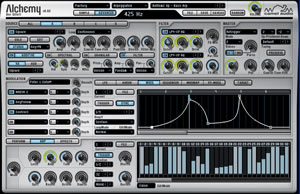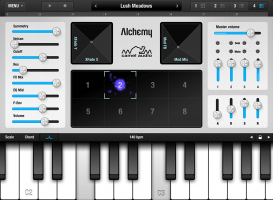Can you design a plug-in that has a conscience...? The answer is 'yes' if you are Ben Gillett from Camel Audio, and designer of Alchemy, one of the deepest synth/sampler plug-ins on the market.
Alchemy has an attractive and functional GUI for several kinds of user: A browser for people who just want to audition sounds. An edit mode that goes all the way to the sample. And finally a Simple mode, designed for performance in mind. but it is supported by a large and continuously expanding library of sound banks. Alchemy advocates and users include BT and Jordan Rudess, as well as film composers Danny Elfman, James Newton Howard, Harry Gregson-Williams and Hans Zimmer.
One thing that is really noteworthy about Ben is the fact that he cares about the planet and has put some of his resources behind it. He comes from an activist family, so he learned about global commitment at an early age. In fact Camel Audio contributes a percent of their profits every year to environmental protection causes.
He was kind enough to take the time to talk to us.
Are you a musician?
Yes - I love writing music - its a big part of my life. I learned piano as a kid - I always enjoyed composing and improvising more than memorizing how to play certain pieces of music which I'm not particularly good at. When I was twelve or so I composed a piece for the school choir and it was great to hear the music I'd written on paper come to life. A few years later artists like the Orb, Prodigy and Orbital inspired me to try writing electronic music.
Thirteen years ago, I was writing drum and bass and gigging a lot in Edinburgh and I wanted to do a certain effect on my bass lines. This was in the early days of virtual instruments and virtual effects. I thought, well there's nothing out there that does what I want so I had a go myself, and my mates liked it. And then I thought, well I could make a better version and put it on the Internet.
That was CamelPhat?
Yes - that was the first version of CamelPhat - our fattening multi-effect. We've improved it a lot since then and it's gone through three major version updates. It's still popular today and many artists use it including big names like Danny Elfman, who said that it's one of his most frequently used plugins. It's surprising to me that something that I created with such limited experience, so long ago is still so widely used. I think the reason, aside from luck, is that I sought to create something that I wanted to use in my own music.
How did you learn programming?
My mum was a teacher and she brought a BBC computer home from school in the holidays, so when I was five I started to learn to program in BASIC. When I was ten I taught myself C, because I wanted to be able to create 3D graphics. I loved being able to think something up and then create it. I carried on through my teenage years - reading computer programming manuals and staying up late programming - as a consequence I wasn't a very cool teenager.
I studied Computer Science and Artificial Intelligence at university, and then a year later did a Research MSc in speech synthesis. During my MSc I made a voice transformation system that could turn one persons speech into another - (Note: if you're a geek you can read Ben's thesis here). Some of what I learnt went into Cameleon 5000 which was the first synthesiser I made and I'm still using ideas I learnt during that MSc all the way up to Alchemy v2 which we're working on now.
When did you start the company?
I released the first version of CamelPhat in 2000, but it wasn't until 2003 after I finished my Research MSc that I started doing it full time. For the first couple of years it was especially hard work - I worked 70 hours a week in my bedroom and lived on whatever was cheap - mostly baked beans.
Why did you call it Camel Audio?
For a very random reason - it wasn't like we had a corporate branding exercise! I had a drape that a friend had brought back from India that had a big camel on it. I had a couple of gigs booked, so I needed a band name and my girlfriend at the time suggested Camel Army, so I went with that. A short while later I made CamelPhat so I needed a company name, so I thought Camel Audio made sense. It's an unusual name and I like camels so I think it still works well. We still have the same drape up on the wall in our office now.
How many of you are there in the company?
There are nine of us working most of our time for Camel Audio. John, Rob, and Michael are developers, Col and Chris are responsible for sound design, Andy takes care of testing and internal tools, Martin runs our website and servers and Oliver takes care of customer support.
We're quite an unusual company in many respects - for a start there's only four of us at the office in Edinburgh, while the other five are scattered between the US, Australia and Denmark. It's a really talented team of people who have skills in multiple areas so we overlap quite a bit which I think is cool. We chat for an hour once a week on Skype to discuss decisions facing the company where everyone has an opportunity to put forward their view about the decisions we make and the direction for the company.
We also have a fantastic team of sound designers who create sounds for Alchemy and our other products. We're always on the look out for new recruits so if you think you have exceptional sound design skills with Alchemy, we'd love to hear from you.
What do you think is the best thing that's happened, from a technology point of view, since you started the company?
I think the increase in processing power has opened up a massive range of opportunities. Faster processor speeds, more cores and more memory allow us to do so much more than we could 10 years ago. Combining multiple synthesis techniques like additive, spectral and granular synthesis with analog modeled filters and a whole range of effects and modulation as we do in Alchemy simply wasn't possible before. This opens up a huge palette of sounds and sound shaping options with very high sound quality to musicians.
The increase in availability of Internet access and faster bandwidth has also been a great thing. It allows people to download products rather than needing to have a box shipped to them, which means they get the product much faster and there's no packaging required. It also means we can communicate directly with our customers and allows us to provide video tutorials to teach people much faster than is possible from a manual.
I also think the widespread availability of touch control surfaces opens up a lot of interesting ways of interacting with sound. You can do things with a touch surface that are impossible with a conventional keyboard and knobs. For example, you can have polyphonic pitch bend which is something we take advantage of in our Alchemy iOS app.
How has your customer changed?
When I started, the people using our software were early adopters and therefore tended to be tech-savvy geeks like me! Many of the people who were our customers in those early days are still our customers, but we've now expanded to also encompass people who are passionate about creating music but not quite so at ease with the tech side. So some users will want to get stuck into designing sounds in the additive editor and some will want great presets that they can tweak easily.
Our free Alchemy Player and free Alchemy iOS app have expanded our reach into those who are relatively new to music making.
What are your biggest challenges today? What keeps you up at night?
We're working on new re-synthesis technologies to allow sounds to be re-synthesised with much higher quality and to allow much more flexibility in how those sounds may be morphed and mutated. Doing the background research on these areas in MATLAB and then making them run in realtime in C++ is a really tough problem - especially when these problems haven't even been solved in academia before. Sometimes these questions literally keep me up at night, trying to figure out better ways to do things.
Another area that is really challenging is figuring out how to design interfaces that allow deep editing and power, whilst simultaneously being easy to use. I'm learning that we should try as hard as possible to minimize the number of controls we offer - i.e. if we can find a way to hide complexity with clever programming and design behind the scenes, then we should do that. A lot of people just want presets, so we provide a big library of sounds. Then the next thing people want to do is to be able to tweak those sounds so we provide the performance section to allow people to do that. And the next layer is maybe you want to design your own sounds, so you've got the advanced page. And I think the layered complexity is a really good approach to the tension between providing something that's easy to use and something that's neat. The people want great sounds have got great sounds. The people that want to bring out the fifth partial of a Tibetan bowl sample can do that, and everything in between.
Figuring out how we can grow without losing all the good things about being small is also a challenge. It means figuring out ways we can all communicate and work effectively as a team, in a way that everyone stays passionately about what we do and is able to have their voice heard and be involved in decision making. It's also a challenge to ensure that we stay close to our customers and listen to them. For many years I did customer support myself which was great for keeping in touch with users. Things that help with this include many camels chatting directly to users on our forum here at KVR and from time to time answering customer support email.
Camel Audio contributes a percentage of the profits to environmental causes every year. What got you into that in the first place?
My dad was a hugely passionate campaigner on environmental issues - it was really his life's work. He taught me how important taking care of our planet is and showed me how beautiful nature is - so I believe that taking care of our planet is a hugely important responsibility we all have. He died when he was hit by a car when out cycling a few years ago. So whilst I'm not devoting my life to environmental causes like he did, I'm trying to do my bit by putting environmental and social responsibility at the heart of who we are and what we do as a company. As part of that, we give a minimum of 1% of sales to environmental charities - so for every $100 spent on our software, we give a minimum of $1 to environmental charities.
Which particular ones?
We've supported Friends of the Earth quite a lot, which is a great organization. We've also given money to Sustrans who make cycle paths and help people to cycle rather than drive. In addition to our 1% for the Planet commitment, we also did 'pay what you want' Alchemy sound library, where people could pay what they wanted and give whatever percentage they wanted to environmental charities, up to the whole lot if they wanted to. That's something we're going to revisit later this year.
Which particular product did you do that with?
 With an Alchemy sound library called Planet Earth.
With an Alchemy sound library called Planet Earth.
It's actually still available for a fixed price, and we still give 50% of those sales to charity.
That's a very cool thing...
 Yea, I think it's a good thing, and I would encourage other companies to do the same. The organization is called 1% for the Planet. It was founded by Yvon Chouinard who wrote a really good book, called Let My People Go Surfing - the Education of a Reluctant Businessman, about the concept of running a company in a way that was socially and environmentally responsible. It's a really good book about his life and about his thoughts on how to run a business in an ethical way.
Yea, I think it's a good thing, and I would encourage other companies to do the same. The organization is called 1% for the Planet. It was founded by Yvon Chouinard who wrote a really good book, called Let My People Go Surfing - the Education of a Reluctant Businessman, about the concept of running a company in a way that was socially and environmentally responsible. It's a really good book about his life and about his thoughts on how to run a business in an ethical way.
Are there other companies you think are doing cool things?
If I were to pick just one example, then I'd say go with Synplant by Sonic Charge. It has a completely different interface to anything else I've ever seen, and works really well for exploring new sounds. I'm a big admirer of companies that create products that are truly innovative whether from a user interface perspective like Synplant or which advance the state of the art in technical terms.
More broadly, I admire companies who are passionate about their products, passionate about taking care of their customers, and who consider their wider responsibilities from a social and environmental respect.
What are you working on now?
We're devoting all our efforts to Alchemy 2. As I mentioned above we're working on improving the quality and flexibility of the re-synthesis algorithms., amongst many other improvements. We're putting a huge amount of effort into every aspect of it not only on the programming side but also on the sample library and sound creation side. In terms of the man years of work going in, this will be the biggest product we've ever made.
We're also working on some new sound libraries with some really cool themes and depth and creativity of sampling. We're also planning to put out regular updates to our Alchemy iOS app over the next year with new features and additional mobile sound libraries.
When you did Alchemy for the iPad, were you imagining it was standalone, or as a controller for the Alchemy plug-in?
You can either use it standalone on the iPad, or you can use it as a control surface for the desktop version. If you want to use it standalone on your iOS device you use it like any other app. In the latest update you can actually create a track with four different parts all using the Alchemy engine which is really cool as it means you can put together a complete song sketch including drums. The app also supports Audiobus and Virtual MIDI so you can use the app with other apps like Garageband and Beatmaker. It's a free download from the app store, with in app purchases for the pro version and extra sound libraries.
If you purchase the pro upgrade for Alchemy on iOS then you can use the app as a remote control for the desktop version. It's great to have a touch surface at your keyboard - it's a lot more immediate, if you're playing and you reach up and touch the remix pad to tweak the sound. You can also do things with touch you can't do with a keyboard - for example, you can touch in multiple places and bend each note separately, which allows you to create really interesting performances. I was chatting to Paul Hartnoll from Orbital and he was excited about the possibilities of using Alchemy in this way on sound tracks for an unusual expressive performance.
Given your own history, what kinds of advice would you offer to other developers that are getting started?
Focus primarily on the product. That might sound obvious, but if you're starting out, focus on the product. Don't worry about copy protection. Don't worry about flashy marketing. Don't worry about any of that stuff. Focus on the product and focus on a musician's need. Don't just do it purely from a technology perspective - think about what musicians actually want, and think about making something that's different from everything else out there.
Who are some of your favorite musicians that use your products?
I'll give you an example of an up and coming guy that I really like, called Phaeleh, which is sort of dubstep influenced, but more downtempo and really musical - many of his tracks also have beautiful female vocals from Soundmouse. It's an honour to have many of the musicians who were influences in me getting into electronic music using our products - such as Amon Tobin, Gary Numan, Liam Howlett of the Prodigy, Sasha, BT, RAM Trilogy and Coldcut to name just a few...
Before I go, I'd like to thank all our customers and everyone at KVR - especially those who post on our forum. We love you all.











 Other Related News
Other Related News
